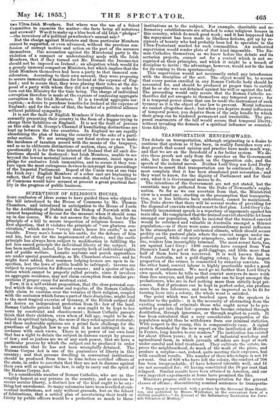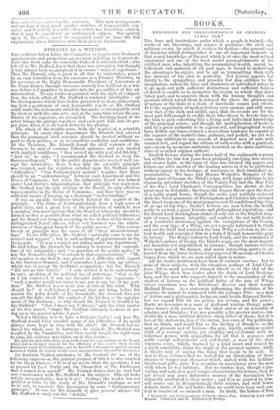TRANSPORTATION HENCEFORWARD.
THE debate on transportation, although originating in a desire to continue that system as it has been, in reality furnishes very evi- dent proofs that sound opinion and practice have made much way, and that we are on the threshold of a far better system. We de- rive these proofs not only from the speeches on the Government side, but also from the speech on the Opposition side, and the speech of the isolated mover. Neither Lord Grey nor Lord Derby ventures to assert that transportation can be continued ; they al- most complain that it has been abandoned past revocation ; and they want to know, for the dignity of Parliament and for their own, what it is Government means to do.
The intentions of the Government are not yet stated, but the
essentials may be gathered from the Duke of Newcastle's expla- nation. So far as we can ascertain from that, the Ministerial view is a sound one ; starting on the presumption that transporta- tion, as it has hitherto been understood, cannot be maintained. The Duke shows that there will be several modes of providing for the disposal of convicts without resort to that plan. Lord Grey's ela- borately inconsistent speech is a repertory of arguments against his main idea. He complained that the trained convict should be let loose amongst our population, while he insisted that the trained convict would be reformed and valuable in Australia amongst a thinner population,—as if there were some extraordinary moral influence in the atmosphere of that celebrated climate, which should secure probity on the pastoral plain where the convict ranges under im- perfect guard, while our misty atmosphere, under the best of po- lice, renders him incorrigibly criminal. The most recent facts, too, are against Lord Grey : 1400 convicts have escaped from Van Diemen's Land to get at the gold-diggings, and little more than half of them have been recovered. It is well known that in South Australia, not a gold-digging colony, by far the largest proportion of the crimes is committed by runaway convicts. On the other hand, convict labour is highly practicable under a good system of confinement. We need go no further than Lord Grey's own speech, where he tells us that convict sawyers do more work than free sawyers, and that perfect order can be kept amongst the probationers, who are in fact nothing more than strictly-kept pri- soners. But if prisoners can be kept in perfect order, can produce more than free labourers, and can be so improved as to be fit for turning loose into a colony, the whole want is satisfied.
One point which was not touched upon by the speakers is
familiar to the public : it is the necessity of abstracting from the existing number of criminals those who ought never to be per- mitted to get into that list—persons who become criminal through destitution, through ignorance, or through neglect in youth. It has been calculated that a very considerable proportion of the population might thus be withdrawn from our criminal statistics. With respect to the young, this is comparatively easy. A signal proof is furnished by the new report on the institution at Mettray in France, long known to our readers.* The institution has existed for about fifteen years ; it is a sort of industrial workshop and agricultural farm, in which juvenile offenders are kept at work under careful and kind treatment. They cultivate the estate, im- prove the neighbourhood, do much of the work of the place, and produce a surplus—not, indeed, quite meeting their expenses, but with excellent results. The number of those who relapse is not 10 per cent. Out of 856 who have left the colony, the conduct of 708 has been irreproachable, 47 have behaved tolerably well, and 16 are not accounted for; 83 having constituted the 10 per cent that relapsed. Similar results have been attained in America, and our own imperfect experiments at home have promised the like.
Ministers propose still to retain transportation for the gravest classes of offence ; discontinuing nominal sentences to transporta-
* This report is translated, with a preface by the Reverend Hans Hamil- ton, and published by Messrs. Whittaker, in the convenient form of a shilling pamphlet—" An Account of the Reformatory Institution for Juve- nile Offenders at Mettray." tion, and always enforcing the sentence. This new arrangement will produce a very much smaller number of transportable con- victs; and it so little resembles that which has heretofore existed, that it may be considered an undiscussed subject. Our opinion upon it, therefore, must be suspended until we have thS full explanation, when Ministers state their plan to Parliament.



























 Previous page
Previous page